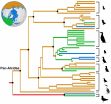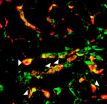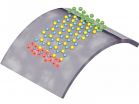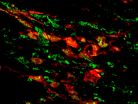Why me? Many women living in poverty blame children, love life
Poor mothers and those in bad relationships suffer more from depression, anxiety, but see a way out
2014-10-15
(Press-News.org) Having had children – particularly early in life – and a dysfunctional romantic relationship are the two most frequently cited reasons when low-income mothers are asked about why they find themselves in poverty. So say American researchers Kristin Mickelson of the School of Social and Behavioral Sciences at Arizona State University, and Emily Hazlett of Kent State University and the Northeast Ohio Medical University, in a new article published in Springer's journal Sex Roles. The researchers believe that how a woman answers the question of "why me?" when thinking about her own impoverished state influences her mental health. Such answers can also provide clues to whether the woman believes she will ever rise out of poverty.
The research done by Mickelson and Hazlett forms part of the larger "Mother's Outcome Matters" study in Northeast Ohio. They analyzed a set of close-ended questions that were put to a community sample of 66 low-income mothers.
The researchers found that women who attributed their poverty to having had children tended to suffer greater levels of depression, possibly because they feel some sense of guilt, blame or helplessness. Women who attributed their poverty to problems in their romantic relationships experienced more anxiety. This might reflect their sense of fear, or lack of control over issues such as domestic violence, the poor spending habits of their partners, or because they do not receive child support. Women who "shook their fists" at the government, or blamed discriminatory practices such as unequal pay to women, suffered both greater depression and anxiety. Only a few blamed fate for their situation.
Most women perceived their current social class to be significantly lower than it was when they themselves were children. They were, however, quite optimistic that they would be able to enjoy middle class living in the not too distant future. This was especially true for women who blamed their poverty on becoming mothers, or the state of their romantic relationships. This might be because they believe they can rise out of poverty once the reasons behind it are removed, for instance when their children leave home, or when they are able to escape a bad relationship.
Therefore, Mickelson and Hazlett suggest that women who blame their motherhood or romantic relationships for their state of poverty will be the ones that benefit most from current mental health programs aimed at domestic violence victims and childcare issues.
"By understanding how women answer the question of who or what is to blame for their current financial situation, we can begin to develop more effective interventions and policies," says Mickelson.
"We are better able to understand whether such women will tend to suffer depression or anxiety, and how they think about their chances of being able to rise above their current social class and situations," adds Hazlett.
INFORMATION:
Reference:
Mickelson, K.D. & Hazlett, E. (2014). "Why me?" Low-Income Women's Poverty Attributions, Mental Health, and Social Class Perceptions, Sex Roles DOI 10.1007/s11199-014-0414-4.
ELSE PRESS RELEASES FROM THIS DATE:
2014-10-15
Modern-day puffins and auks have long been recognized as environmental indicator species for ongoing faunal shifts, and fossil records now indicate that ancient relatives were similarly informative. Researchers have found that puffins and auks may have been at their most diverse and widespread levels during a relatively warm period of Earth's history. The results also explain how past extinctions have shaped the geographic distribution and population size of existing species.
Authors Adam Smith of the National Evolutionary Synthesis Center (NESCent) in Durham, N.C., and ...
2014-10-15
COLLEGE PARK, Md. – A new analysis of global energy use, economics and the climate shows that without new climate policies, expanding the current bounty of inexpensive natural gas alone would not slow the growth of global greenhouse gas emissions worldwide over the long term, according to a study appearing today in Nature.
Because natural gas emits half the carbon dioxide of coal, many people hoped the recent natural gas boom could help slow climate change—and according to government analyses, natural gas did contribute partially to a decline in U.S. carbon ...
2014-10-15
This market effect erases the advantage of lower emissions from the natural gas itself, according to an unprecedented international comparison of computer simulations.
"The upshot is that abundant natural gas alone will not rescue us from climate change," says the lead author Haewon McJeon of the Department of Energy's Pacific Northwest National Laboratory (PNNL). Especially in the US advances such as hydraulic fracturing – pumping liquids into stone to break it up and release the gas, known as fracking – and horizontal drilling have led to bountiful natural ...
2014-10-15
UCLA researchers have discovered that some scar-forming cells in the heart, known as fibroblasts, have the ability to become endothelial cells — the cells that form blood vessels. The finding could point the way toward a new strategy for treating people who have suffered a heart attack, because increasing the number of blood vessels in the heart boosts its ability to heal after injury.
In studies involving mice, the UCLA team also found that a drug could enhance this phenomenon and improve the repair process after a heart attack.
The research is published in the ...
2014-10-15
New York, NY—October 15, 2014—Researchers from Columbia Engineering and the Georgia Institute of Technology report today that they have made the first experimental observation of piezoelectricity and the piezotronic effect in an atomically thin material, molybdenum disulfide (MoS2), resulting in a unique electric generator and mechanosensation devices that are optically transparent, extremely light, and very bendable and stretchable.
In a paper published online October 15, 2014, in Nature, research groups from the two institutions demonstrate the mechanical ...
2014-10-15
CHAPEL HILL – Researchers from the UNC School of Medicine have discovered that cells called fibroblasts, which normally give rise to scar tissue after a heart attack, can be turned into endothelial cells, which generate blood vessels to supply oxygen and nutrients to the injured regions of the heart, thus greatly reducing the damage done following heart attack.
This switch is driven by p53, the well-documented tumor-suppressing protein. The UNC researchers showed that increasing the level of p53 in scar-forming cells significantly reduced scarring and improved heart ...
2014-10-15
Removing a child's tonsils is one of the most common surgeries performed in the United States, with approximately 500,000 children undergoing the procedure each year. New research finds that children from lower-income families are more likely to have complications following the surgery.
In the first study of its kind to analyze post-operative complications requiring a doctor's visit within the first 14 days after tonsillectomy, researchers saw a significant disparity based on income status, race and ethnicity.
"Surprisingly, despite all children having a relatively ...
2014-10-15
WORCESTER, MA – An international group of scientists led by Gang Han, PhD, at the University of Massachusetts Medical School, has combined a new type of nanoparticle with an FDA-approved photodynamic therapy to effectively kill deep-set cancer cells in vivo with minimal damage to surrounding tissue and fewer side effects than chemotherapy. This promising new treatment strategy could expand the current use of photodynamic therapies to access deep-set cancer tumors.
"We are very excited at the potential for clinical practice using our enhanced red-emission nanoparticles ...
2014-10-15
Montréal, October 15, 2014 – An important scientific breakthrough by a team of IRCM researchers led by Michel Cayouette, PhD, is being published today by The Journal of Neuroscience. The Montréal scientists discovered that a protein found in the retina plays an essential role in the function and survival of light-sensing cells that are required for vision. These findings could have a significant impact on our understanding of retinal degenerative diseases that cause blindness.
The researchers studied a process called compartmentalization, which establishes ...
2014-10-15
Do you believe in science? Your faith in science may actually make you more likely to trust information that appears scientific but really doesn't tell you much. According to a new Cornell Food and Brand Lab study, published in Public Understanding of Science, trivial elements such as graphs or formulas can lead consumers to believe products are more effective. "Anything that looks scientific can make information you read a lot more convincing," says the study's lead author Aner Tal, PhD, "The scientific halo of graphs, formulas, and other trivial elements that look scientific ...
LAST 30 PRESS RELEASES:
[Press-News.org] Why me? Many women living in poverty blame children, love life
Poor mothers and those in bad relationships suffer more from depression, anxiety, but see a way out





